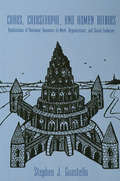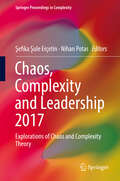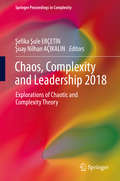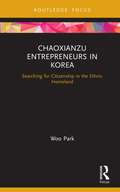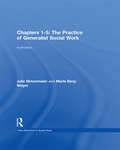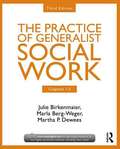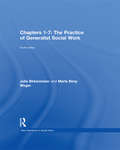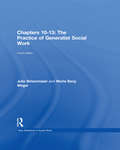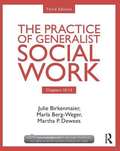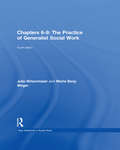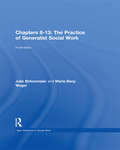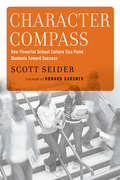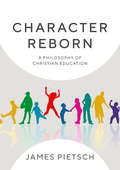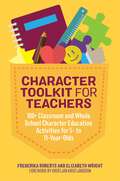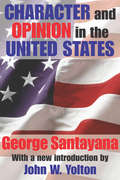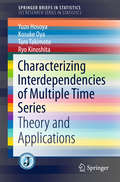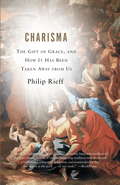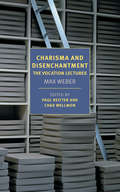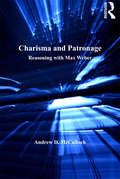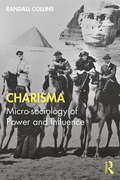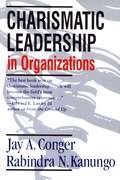- Table View
- List View
Chaos, Catastrophe, and Human Affairs: Applications of Nonlinear Dynamics To Work, Organizations, and Social Evolution
by Stephen J. GuastelloWhether talking about steering a wheelbarrow over rugged terrain or plotting the course of international relations, human performance systems involve change. Sometimes changes are subtle or evolutionary, sometimes they are catastrophic or revolutionary, and sometimes the changes are from periods of relative calm to periods of vibrant oscillations to periods of chaos. As a general rule, more complex systems are likely to produce more complex forms of change. Although social scientists have long acknowledged that change occurs and have considered ways to effect desirable change, the dynamical processes of change have been poorly understood in the past. This volume combines recent advances in mathematics and experimental design with the best available social science theories to produce a new, integrated, and compact theory of work, organizations, and social evolution. The domains of application extend from human decision-making processes to personnel selection and work motivation, work performance under conditions of stress, accident and health risk analysis, the development of social institutions and economic systems, creativity and innovation, organizational development and group dynamics, and political revolutions and war. Relative to other literature on nonlinear dynamical systems theory (NDS), this book is unique in that it integrates new developments in NDS with substantive psychological theory. It builds on many recent developments in organizational theory to show that nonlinear dynamics were often implicit in those works all along. The result is an entirely new way of viewing social events, understanding change processes, and asking questions about social systems. This book also contains much new empirical work and explains the newly developed methods for testing these new hypotheses.
Chaos, Complexity and Leadership 2017: Explorations Of Chaos And Complexity Theory (Springer Proceedings in Complexity)
by Şefika Şule Erçetin Nihan PotasThe proceedings of the 2017 Symposium on Chaos, Complexity and Leadership illuminate current research results and academic work from the fields of physics, mathematics, education, economics, as well as management and social sciences. The text explores chaotic and complex systems, as well as chaos and complexity theory in view of their applicability to management and leadership.This proceedings explores non-linearity as well as data-modelling and simulation in order to uncover new approaches and perspectives. Effort will not be spared in bringing theory into practice while exploring leadership and management-laden concepts. This book will cover the analysis of different chaotic developments from different fields within the concepts of chaos and complexity theory. Researchers and students in the field will find answers to questions surrounding these intertwined and compelling fields.
Chaos, Complexity and Leadership 2018: Explorations of Chaotic and Complexity Theory (Springer Proceedings in Complexity)
by Şefika Şule Erçeti̇n Şuay Nilhan AçikalinThis book constitutes the proceedings of the 6th International Symposium on Chaos, Complexity and Leadership (ICCLS). Written by interdisciplinary researchers and students from the fields of mathematics, physics, education, economics, political science, statistics, the management sciences and social sciences, the peer-reviewed contributions explore chaotic and complex systems, as well as chaos and complexity theory in the context of their applicability to management and leadership. The book discusses current topics, such as complexity leadership in the healthcare fields and tourism industry, conflict management and organization intelligence, and presents practical applications of theoretical concepts, making it a valuable resource for managers and leaders.
Chaoxianzu Entrepreneurs in Korea: Searching for Citizenship in the Ethnic Homeland (Routledge Focus on Asia)
by Park WooThis book explores the nature of the state-citizen societal relationship in Korea during the transition to neoliberalism, through the lenses of class and nationalism. Examining the process by which a new class, Korean Chinese entrepreneurs, emerged from Korean Chinese enclaves in South Korea and quickly became a leading group within those communities, this book provides a case study of the entrepreneurs running a variety of businesses, including restaurants, travel agencies and trading companies. Whilst Korean Chinese people faced discrimination and stigmatization in Korea, despite their economic contributions to the economy, this book demonstrates how entrepreneurs began to form associations and organisations, campaigning for their equal status in Korean society. Arguing that the formation of these was closely linked to the framework of legal statuses established by the Korean state as it sought to make use of Korean Chinese labour, this book explains how social citizenship was constituted by the interaction between their situational sense of fairness and the contradictory economic and social roles expected of them by the state. Drawing on fifteen years of ethnographical experience, Chaoxianzu Entrepreneurs in Korea will be useful to students and scholars of sociology, anthropology, Migration Studies and Ethnic Studies, as well as Korean Studies.
Chapters 1-5: The Practice of Generalist Social Work
by Marla Berg-Weger Julie BirkenmaierThe fourth edition of?The Practice of Generalist Social Work?continues to teach students to apply micro, macro, and mezzo social work skills. This new edition strengthens the connection between the three levels of practice and is fully updated to the 2015 EPAS. This edition also contains more illustrations of theory and more context for deciding which type of intervention is a good fit. Most chapters now open with a case study and continually refer back to the case to provide additional connections between theory and real-life practice. Each chapter also incorporates a link to a Grand Challenge of Social Work from the American Academy of Social Work and Social Welfare, which shows the connection between social work and the most significant societal challenges of today. The Quick Guides within the text offer students guidance for their field experience and practice after graduation. The text also comes with a rich companion website that includes support materials and six unique cases that encourage students to learn by doing. Go to?www.routledgesw.com to explore the cases and additional resources.
Chapters 1-5: The Practice of Generalist Social Work, Third Edition
by Marla Berg-Weger Julie Birkenmaier Martha P. DeweesThis text for generalist practice courses is also available with a treasure trove of related materials for use in a two or three-course practice sequence. The text helps translate the guiding theoretical perspectives of social justice, human rights, and critical social construction into purposeful social work practice. Six unique cases, specially written for this Series, provide a "learning by doing" framework unavailable from any other social work publisher. Companion readings and many other resources enable this text to be the centerpiece for three semesters of practice teaching. Go to www.routledgesw.com to learn more. This custom edition includes the first five chapters for instructors teaching the first semester of a three-semester generalist practice sequence, and is also available in e-book editions in a full range of digital formats.
Chapters 1-7: The Practice of Generalist Social Work
by Marla Berg-Weger Julie BirkenmaierThe fourth edition of?The Practice of Generalist Social Work?continues to teach students to apply micro, macro, and mezzo social work skills. This new edition strengthens the connection between the three levels of practice and is fully updated to the 2015 EPAS. This edition also contains more illustrations of theory and more context for deciding which type of intervention is a good fit. Most chapters now open with a case study and continually refer back to the case to provide additional connections between theory and real-life practice. Each chapter also incorporates a link to a Grand Challenge of Social Work from the American Academy of Social Work and Social Welfare, which shows the connection between social work and the most significant societal challenges of today. The Quick Guides within the text offer students guidance for their field experience and practice after graduation. The text also comes with a rich companion website that includes support materials and six unique cases that encourage students to learn by doing. Go to?www.routledgesw.com to explore the cases and additional resources.
Chapters 10-13: The Practice of Generalist Social Work
by Marla Berg-Weger Julie BirkenmaierThe fourth edition of?The Practice of Generalist Social Work?continues to teach students to apply micro, macro, and mezzo social work skills. This new edition strengthens the connection between the three levels of practice and is fully updated to the 2015 EPAS. This edition also contains more illustrations of theory and more context for deciding which type of intervention is a good fit. Most chapters now open with a case study and continually refer back to the case to provide additional connections between theory and real-life practice. Each chapter also incorporates a link to a Grand Challenge of Social Work from the American Academy of Social Work and Social Welfare, which shows the connection between social work and the most significant societal challenges of today. The Quick Guides within the text offer students guidance for their field experience and practice after graduation. The text also comes with a rich companion website that includes support materials and six unique cases that encourage students to learn by doing. Go to?www.routledgesw.com to explore the cases and additional resources.
Chapters 10-13: The Practice of Generalist Social Work, Third Edition
by Marla Berg-Weger Julie Birkenmaier Martha P. DeweesThis text for generalist practice courses is also available with a treasure trove of related materials for use in a two or three-course practice sequence. The text helps translate the guiding theoretical perspectives of social justice, human rights, and critical social construction into purposeful social work practice. Six unique cases, specially written for this Series, provide a "learning by doing" framework unavailable from any other social work publisher. Companion readings and many other resources enable this text to be the centerpiece for three semesters of practice teaching. Go to www.routledgesw.com to learn more. This custom edition includes chapters 10-13 for instructors teaching the third semester of a three-semester generalist practice sequence, and is also available in e-book editions in a full range of digital formats.
Chapters 6-9: The Practice of Generalist Social Work
by Marla Berg-Weger Julie BirkenmaierThe fourth edition of?The Practice of Generalist Social Work?continues to teach students to apply micro, macro, and mezzo social work skills. This new edition strengthens the connection between the three levels of practice and is fully updated to the 2015 EPAS. This edition also contains more illustrations of theory and more context for deciding which type of intervention is a good fit. Most chapters now open with a case study and continually refer back to the case to provide additional connections between theory and real-life practice. Each chapter also incorporates a link to a Grand Challenge of Social Work from the American Academy of Social Work and Social Welfare, which shows the connection between social work and the most significant societal challenges of today. The Quick Guides within the text offer students guidance for their field experience and practice after graduation. The text also comes with a rich companion website that includes support materials and six unique cases that encourage students to learn by doing. Go to?www.routledgesw.com to explore the cases and additional resources.
Chapters 8-13: The Practice of Generalist Social Work
by Marla Berg-Weger Julie BirkenmaierThe fourth edition of?The Practice of Generalist Social Work?continues to teach students to apply micro, macro, and mezzo social work skills. This new edition strengthens the connection between the three levels of practice and is fully updated to the 2015 EPAS. This edition also contains more illustrations of theory and more context for deciding which type of intervention is a good fit. Most chapters now open with a case study and continually refer back to the case to provide additional connections between theory and real-life practice. Each chapter also incorporates a link to a Grand Challenge of Social Work from the American Academy of Social Work and Social Welfare, which shows the connection between social work and the most significant societal challenges of today. The Quick Guides within the text offer students guidance for their field experience and practice after graduation. The text also comes with a rich companion website that includes support materials and six unique cases that encourage students to learn by doing. Go to?www.routledgesw.com to explore the cases and additional resources.
Character Compass: How Powerful School Culture Can Point Students Toward Success
by Howard Gardner Scott SeiderIn Character Compass, Scott Seider offers portraits of three high-performing urban schools in Boston, Massachusetts that have made character development central to their mission of supporting student success, yet define character in three very different ways. One school focuses on students' moral character development, another emphasizes civic character development, and the third prioritizes performance character development. Drawing on surveys, interviews, field notes, and student achievement data, Character Compass highlights the unique effects of these distinct approaches to character development as well as the implications for parents, educators, and policymakers committed to fostering powerful school culture in their own school communities.
Character Compass: How Powerful School Culture Can Point Students Toward Success
by Scott Seider2013 American Educational Research Association's (AERA) Moral Development and Education Outstanding Book Award In Character Compass, Scott Seider offers portraits of three high-performing urban schools in Boston, Massachusetts that have made character development central to their mission of supporting student success, yet define character in three very different ways. One school focuses on students&’ moral character development, another emphasizes civic character development, and the third prioritizes performance character development. Drawing on surveys, interviews, field notes, and student achievement data, Character Compass highlights the unique effects of these distinct approaches to character development as well as the implications for parents, educators, and policymakers committed to fostering powerful school culture in their own school communities.
Character Reborn: A Philosophy of Christian Education
by James PietschMore than one million students in Australia attend schools founded by churches and other Christian organisations.What is it that sets these schools apart?More importantly, what is it that should set these schools apart?In Character Reborn, James Pietsch offers a fresh examination of the unique capacities and opportunities of Christian schools in Australia today.More than ever before, Christian schools are a significant point of contact between Christian communities and those with little or no understanding of the Christian worldview. Dr Pietsch challenges Christian educators to consider how they might maximise their opportunities to share the good news of Jesus with this wider community that is drawn to Christian schooling. To this end, he sets out an approach to education that focuses on learning character, whereby students in the Christian school context experience and practise the values of the kingdom of God – grace, compassion, kindness, and humility – as integral to their development, whatever their religious or cultural background.This book presents an inspiring blueprint for building up today’s students as people of Christian character – preparing them for the challenges of the current age and giving them insight into the age to come.
Character Toolkit for Teachers: 100+ Classroom and Whole School Character Education Activities for 5- to 11-Year-Olds
by Kristján Kristjánsson Elizabeth Wright Frederika RobertsThis accessible and much-needed resource sets out advice on how to develop character and encourage wellbeing in pupils aged 5-11. Schools are increasingly aware of how beneficial positive character skills can be, but resources on how to develop them are scarce. This book gives teachers the means to promote gratitude, positive emotions, character strengths, and positive relationships through 100+ easy-to-implement activities such as student diaries, classroom displays and letter writing campaigns. It also includes tools and strategies that go beyond the classroom, helping to embed character education into the culture and ethos of the entire school. Each chapter will include a short introduction to the relevant theoretical background, and all activities are based on validated character education and positive psychology interventions. Bite-sized and practical, and full of ideas that can be dipped in and out of in the classroom, this is an ideal book for busy teachers.
Character and Opinion in the United States: With Reminiscences Of William James And Josiah Royce And Academic Life In America (1921)
by George SantayanaGeorge Santayana was one of the most influential twentieth-century philosophers. Because of his broad-ranging interests and lack of any permanent home in one particular country, he has often been stereotyped as a meditative philosopher removed from the world, living in what he himself called the "realm of spirit" among eternal essences. While there is some truth in this characterization, it is also true that Santayana was a penetrating analyst and critic of contemporary societies.'Character and Opinion in the United States' is his comprehensive critique of American thought and civilization and reflects the detached cosmopolitan perspective that lent his criticism its characteristic objectivity and strength. Santayana's subject here is the conflict of materialism and idealism in American life. In his view there exists a dualism in the American mind: One side, dealing with religion, literature, philosophy, and morality, tended to stay with inherited, old doctrines-the genteel tradition-and failed to keep pace with the other, practical side and its new developments in industry, invention, and social organization. Santayana traces the first mentality to Calvinism and its sense of sin, an attitude out of keeping with a new civilization and the dominance of practical interests. As a consequence of separating philosophy from everyday life, its study merely served religious and moral interests cut off from the free search for truth. At the heart of the book is Santayana's examination of the influential thought of William James and Josiah Royce, who typified for him the dilemma of American thought. The subordination of thought to social form and custom underlies Santayana's sharp critique of academic philosophy at Harvard where he early on studied and taught. He was disturbed by the very idea of philosophy as an academic discipline. Philosophy, he felt, should be an individual, original creation, "something dark, perilous, untested, and not ripe to be taught" Santayana's analysis of how social imperatives may impede the pursuit of knowledge remains pertinent to contemporary intellectual debate. This volume ill be of interest to philosophers, intellectual historians, and American studies specialists.
Character and Social Structure: The Psychology of Social Institutions
by C. Wright Mills Hans GerthThis book is a fully rounded synthesis which incorporates all the major conceptions of psychology and sociology that bear upon the formation of character and personality in the context of social structure.
Characterizing Interdependencies of Multiple Time Series: Theory and Applications (SpringerBriefs in Statistics)
by Yuzo Hosoya Kosuke Oya Taro Takimoto Ryo KinoshitaThis book introduces academic researchers and professionals to the basic concepts and methods for characterizing interdependencies of multiple time series in the frequency domain. Detecting causal directions between a pair of time series and the extent of their effects, as well as testing the non existence of a feedback relation between them, have constituted major focal points in multiple time series analysis since Granger introduced the celebrated definition of causality in view of prediction improvement. Causality analysis has since been widely applied in many disciplines. Although most analyses are conducted from the perspective of the time domain, a frequency domain method introduced in this book sheds new light on another aspect that disentangles the interdependencies between multiple time series in terms of long-term or short-term effects, quantitatively characterizing them. The frequency domain method includes the Granger noncausality test as a special case. Chapters 2 and 3 of the book introduce an improved version of the basic concepts for measuring the one-way effect, reciprocity, and association of multiple time series, which were originally proposed by Hosoya. Then the statistical inferences of these measures are presented, with a focus on the stationary multivariate autoregressive moving-average processes, which include the estimation and test of causality change. Empirical analyses are provided to illustrate what alternative aspects are detected and how the methods introduced here can be conveniently applied. Most of the materials in Chapters 4 and 5 are based on the authors' latest research work. Subsidiary items are collected in the Appendix.
Charakter – Haltung – Habitus: Persönlichkeit und Verantwortung in der Bundeswehr (Militär und Sozialwissenschaften/The Military and Social Research #55)
by Angelika Dörfler-Dierken Christian GöbelDer Band beleuchtet Konzepte und Methoden der Persönlichkeitsbildung im Militär. Beiträge aus verschiedenen Disziplinen der Geistes- und Gesellschaftswissenschaften bieten inspirierende Anregungen in der gegenwärtigen Diskussion um neue Formate der ethischen Bildung in der Bundeswehr und das soldatische Selbstverständnis. Vor dem Hintergrund der Inneren Führung und des Grundgesetzes müssen deutsche Soldatinnen und Soldaten gerade in Zeiten von über die Landesverteidigung hinausgehenden Einsätzen moralische Urteilskompetenz entwickeln, um Verantwortung für sich und andere übernehmen zu können.
Charakteristika von Aufgaben in der Domäne Rechnungswesen: Eine fachdidaktische Analyse
by Simone StützDas vorliegende Buch beschäftigt sich mit den Charakteristika von Aufgaben in der Domäne Rechnungswesen aus einer fachdidaktischen Perspektive. Dazu wurde der aktuelle fachdidaktische Diskussionsstand aus der Fachdidaktik Rechnungswesen aufgearbeitet und auf Basis dessen ein umfassendes Kategoriensystem zur Analyse und Bewertung von Aufgaben aus dem Rechnungswesen entwickelt. Das Kategoriensystem kann des Weiteren genutzt werden, um neue Aufgaben für das Rechnungswesen zu entwickeln und bestehende Aufgaben zu optimieren. Darüber hinaus wurden 2.000 Rechnungswesenaufgaben aus 15 verschiedenen Schulbüchern von drei österreichischen Verlagen mithilfe des Kategoriensystems analysiert und bewertet. Damit kann der Wissensstand zu den Charakteristika von Aufgaben in der Domäne Rechnungswesen erheblich erweitert werden. Die Ergebnisse der umfassenden Auswertungen zeigen, dass bei den Aufgaben Verbesserungspotenzial besteht und die im Rahmen des Kategoriensystems formulierten Ansprüche an Aufgaben im Rechnungswesen derzeit nicht umfassend erfüllt werden. Darüber hinaus wird festgestellt, dass im derzeitigen Rechnungswesenunterricht sowohl eine Änderung der Aufgabenkultur als auch curriculare Änderungen und Weiterentwicklungen notwendig sind.
Charisma
by Philip RieffThe world is full of people who look like charismatics and try to act the part, says retired sociologist Rieff, but they are all surface and no depth: we are all mirrors, but mirrors of the mundane world around us rather than of any internal or transcendent spirit. He looks at the charismatic foundations of culture, the therapeutic foundations of anti-culture, and the triumph of the therapeutic over the charismatic. Annotation ©2007 Book News, Inc. , Portland, OR (booknews. com)
Charisma and Disenchantment: The Vocation Lectures
by Max WeberA new translation of two celebrated lectures on politics, academia, and the disenchantment of the world.The German sociologist Max Weber is one of the most venturesome, stimulating, and influential theorists of the modern condition. Among his most significant works are the so-called vocation lectures, published shortly after the end of World War I and delivered at the invitation of a group of student activists. The question the students asked Weber to address was simple and haunting: In a modern world characterized by the division of labor, economic expansion, and unrelenting change, was it still possible to consider an academic or political career as a genuine calling? In response Weber offered his famous diagnosis of &“the disenchantment of the world,&” along with a challenging account of the place of morality in the classroom and in research. In his second lecture he introduced the notion of political charisma, assigning it a central role in the modern state, even as he recognized that politics is more than anything &“a slow and difficult drilling of holes into hard boards.&” Damion Searls&’s new translation brings out the power and nuance of these celebrated lectures. Paul Reitter and Chad Wellmon&’s introduction describes their historical and biographical background, reception, and influence. Weber&’s effort to rethink the idea of a public calling at the start of the tumultuous twentieth century is revealed to be as timely and stirring as ever.
Charisma and Patronage: Reasoning with Max Weber
by Andrew D. McCullochA detailed and richly illustrated analysis of charisma and the political and cultural conditions in which charismatic figures arise, this work of historical sociology critically engages with Max Weber’s ambiguous concept of charisma to examine the charismatic careers of a number of figures, including Joan of Arc, Hitler and Nelson Mandela, as well as that of Jesus, who, the author contends - in contradistinction to Max Weber - was not a charismatic leader, in spite of his portrayal in Christian theology. Shedding light on the process of charismatic transformation as it occurs within intensely solidaristic groups and the importance of patronage in charismatic careers, the book distinguishes between charismatic rule and charismatic leadership. With close attention to the social and political legacy of charisma for modern capitalism, it also examines the emergence of a global class of the super-rich, a process buttressed by a belief on the part of business leaders in their own charismatic powers. A rigorous examination of the under-researched political process of charisma, the understanding of which remains as important in modern society as in history, Charisma and Patronage will appeal to students and scholars across a range of disciplines, including sociology, history, politics and social geography.
Charisma: Micro-sociology of Power and Influence
by Randall CollinsWhat is charisma? And how does it generate influence and power? World-renowned sociologist Randall Collins explores these and many other questions in a highly readable exploration of the various forms of charisma and how charisma elevated Jesus, Cleopatra, Lawrence of Arabia, Queen Elizabeth, Hitler, Churchill, Franklin and Eleanor Roosevelt, Madame Mao Zedong, and others. He explores four types of charisma: frontstage, backstage, success-magic, and reputational charisma. Not everyone has the same kind of charisma and Collin’s identifies important differences and their relations to power. The book exemplifies Collin’s sophisticated micro-sociology in accessible and compelling prose, quietly building subtle matrices of analysis that show how sociology unveils hidden discoveries.
Charismatic Leadership in Organizations
by Jay A. Conger Rabindra N. KanungoThis book not only integrates the growing body of research and theory on charismatic leadership, but also pushes back the frontiers of our knowledge by introducing new theories and insights. The authors present a comprehensive model of the charismatic leadership process. The model is documented by extensive empirical research and richly illustrated with case examples of corporate leaders.
